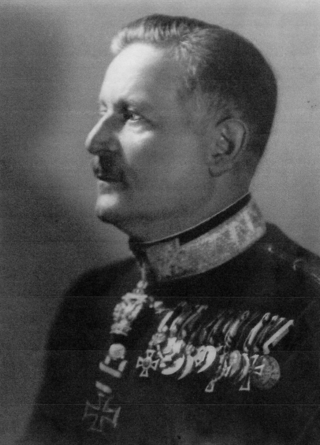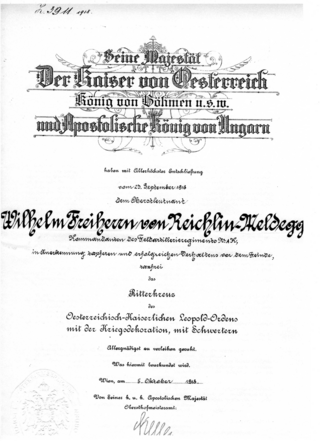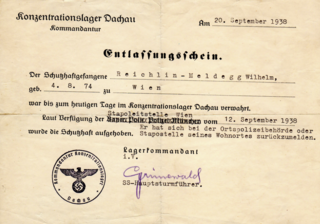Oberst a.D. Wilhelm Freiherr von Reichlin-Meldegg

Personalia
Born:
Died:
Profession:
Persecution:
Imprisonment 19.03.1938 - 17.06.1938,
Dachau concentration camp 17.06.1938 - 20.09.1938
Honors:
Knight's Cross of the Austrian Imperial Order of Leopold with KD and swords
Order of the Iron Crown II. Class KD and Swords
Cross of Military Merit III Class with KD and Swords
Military Service Medal with red ribbon
War Medal
Royal Spanish Order of Military Merit I. Class
Royal Prussian Order of Military Merit III Class
Iron Cross II Class (World War I)
Memberships
Curriculum Vitae
Wilhelm Freiherr von Reichlin-Meldegg was born in Vienna as the legitimate son of Field Marshal Lieutenant Karl Friedrich Freiherr von Reichlin-Meldegg and Maria Rosa Susanna Angela Augusta, née Reitz. He is the younger brother of retired colonel Friedrich Freiherr von Reichlin-Meldegg. After elementary school and two lower grades at the grammar school in Znaim [today: Znojmo in the Czech Republic], he transferred to the military lower secondary school in Eisenstadt and then to the military upper secondary school in Mährisch-Weißkirchen, where he graduated in 1891. He then went to the Technical Military Academy in Vienna and was commissioned a lieutenant in 1894. In the same year, he joined Artillery Regiment No. 12. Wilhelm Freiherr von Reichlin-Meldegg married Valerie Freiin Probszt von Ohstorff on November 10, 1897. He had two sons with her, Erich and Herbert.
In 1900, he transferred to Artillery Regiment No. 2. Wilhelm Freiherr von Reichlin-Meldegg was promoted to first lieutenant in 1908 and to captain in 1911. As a captain, he was deployed to the Russian front after the outbreak of the First World War and promoted to major in 1916. He was later deployed on the Italian front and disarmed as a lieutenant colonel in 1918.
After the defeat of Austria-Hungary, the dismantling of the Dual Monarchy and the expulsion of the House of Habsburg from Austria, the staunch legitimist refused to swear his oath to the new republic, which is why he was not accepted into the new army and retired as a colonel.
In the 1920s and 1930s, Wilhelm Freiherr von Reichlin-Meldegg became involved in the Reichsbund der Österreicher and the Eisernen Ring (umbrella organization of legitimist organizations). In 1932, he became chairman of the Eisernen Ring and Vienna regional chairman of the Reichsbund der Österreicher. He also became chairman of the Association of Officers of the Equestrian Artillery, whose patronage (honorary protectorate) was assumed by Otto von Habsburg

Dear Colonel Freiherr von Reichlin-Meldegg,
In response to the request of the officers of the Cavalry Artillery in Vienna, I am assuming the honorary protectorate over their unit.
I would like to thank the soldiers who have made trust in God, loyalty to the emperor, love of country, technical knowledge and skill, as well as a daring equestrian spirit into an outstanding weapon of the imperial army.
She did not stop at the proud memories associated with the Van der Gröben cavalry battery, but also proved what self-sacrifice is capable of in the "last equestrian battle in world history". The experiences of the World War forced the cavalry to get off their horses, forcing the cavalry batteries to submerge themselves in the great artillery. They now shared in their glory. Together with the other batteries, they shook the enemy, paved the way for the good foot soldiers into the enemy's ranks and covered their retreat when the luck of battle deserted the imperial banners. Then the last gunner often sank to the ground next to the last firing gun.
Honor the memory of these brave men!
But to the survivors I say moving thanks for the example of loyalty and sacrifice that they offered in difficult but still worthwhile times. May it be a guide for the present and the future, so that the virtues of the old cavalry artillery may fill the young army and future generations.
My best wishes, dear Colonel Freiherr von Reichlin-Meldegg, to all your comrades and accept the following picture for your unit.
From abroad, May 3, 1936
Otto
On March 12, 1938, he witnessed the demise of a free and independent Austria with the invasion of the German Wehrmacht. On March 19, 1938, Wilhelm Freiherr von Reichlin-Meldegg was arrested by the Gestapo and deported to the Dachau concentration camp on June 17, 1938. He is severely maltreated in the concentration camp. He was released from prison on September 20, 1938, but had to report to the police every week thereafter. He remains in retirement.

Citations
Österreichisches Staatsarchiv (ÖStA)
Wiener Stadt- und Landesarchiv (WStLA)
Georg Frhr. von Reichlin-Meldegg, Privat
Andreas Frhr. von Reichlin-Meldegg, Privat
Friedhöfe Wien - Verstorbenensuche
